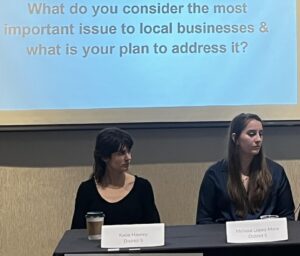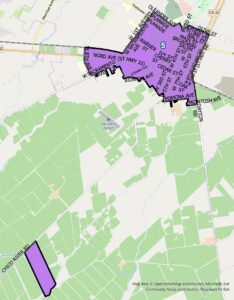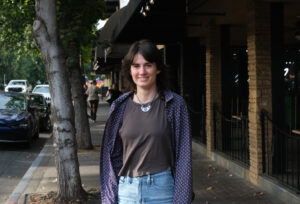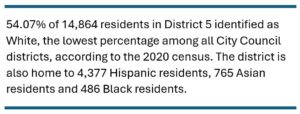by Yucheng Tang
posted Oct. 18
This is the third in ChicoSol’s City Council election series. Read our District 3 story here and our District 1 story here.
Renter rights. Pedestrian safety. The unhoused. These are the issues people living in District 5 care most about.
Kaylee Hudson, 29, a Chico State MBA student, worries most about pedestrian safety in the district. She came to Chico only five months ago, but has already been hit by a car while crossing the street downtown during the daytime. Hudson said the driver didn’t stop after hitting her.

Bryce Ingersoll, a Chico State undergraduate, told ChicoSol that he cares most about renter protection. There are many old buildings in District 5, Ingersoll said, and one place he rented had mold infestations growing in the walls. He, like many renters, didn’t want to deal with the landlords, leaving those problems unsolved.
“I hope there is a system where we can complain about the mold to the government and the government can require landlords to do what they are supposed to do,” Ingersoll said.
Ingersoll, Hudson, and a few other residents mentioned that they also worry about homelessness. Hudson said that many of her friends are unwilling to hang out in the Plaza because of so many homeless people there, “which creates a weird vibe.”
“I want a council member who can take common people’s ideas seriously, rather than someone who only listens to where money is,” Ingersoll said.

District 5 is in the southwest corner of Chico, where Chico State University brings diversity, energy – and a lot of renters. The candidates running for the District 5 seat are Katie Hawley, who earlier this year received her Master’s in political science at Chico State, and Melissa Lopez-Mora, a senior business student at Chico State.
Hawley grew up in a car-dependent suburb in San Diego. She told ChicoSol that, “Coming to Chico and being able to go to the farmers market and walk to school and bike across town, I felt like I had something that had been missing from the rest of my life and that was community.”
Lopez-Mora was born and raised in Chico. She was absent from the League of Women Voters’ forum that the other candidates attended. Her absence prevented Hawley from participating because of League rules. Later, Hawley expressed her disappointment on her Instagram account: “I wished that my opponent was there so District 5 could’ve had some visibility.”
“I want a council member who can take common people’s ideas seriously” — Bryce Ingersoll
ChicoSol interviewed and photographed Hawley on Sept. 11. She puts climate resilience, affordable housing, and safe streets as her policy priorities. Lopez-Mora didn’t respond to the interview request delivered through emails and social media. On her website, she says she will work to ensure safe, affordable neighborhoods, improve Chico’s streets and public services, and support smart growth, small businesses, and student life. But she doesn’t mention any further measures or policies.
Hawley: Climate resilience connects with issues
The top issue on Hawley’s mind is climate resilience, because “it’s encompassing different issues. It has to do with housing, it has to do with streets, it has to do with the well being of our residents.”
She took housing issues as an example. “We are facing extreme heat Chico has never seen. The people that don’t have AC and the people that are living in the most exposed areas are likely to be District 5 residents as well. We are where a lot of the pockets of poverty are, like North Avenue; we have some public housing there.”
She says she has canvassed publicly subsidized housing apartment complexes and has seen many apartments that have black mold infestations and AC units that don’t work.
Her solution to build climate resilience would be to collaborate with organizations that alleviate the effects of extreme weather for residents, actively pursue opportunities for community-owned energy systems to increase energy equity and decrease dependence on PG&E, as well as diversify energy sources.
Hawley loves trees and feels strongly about maintaining the City’s tree canopy: “It sounds a little corny, but trees are a giant savings account for cities in any municipality.” She said trees can help relieve the burden of the stormwater system. “They also keep the city cool in times of extreme heat. They keep the city a little bit warmer in winter because they attract condensation.”
So, protecting trees on City property and planting more trees that are adaptable to a warming climate are part of her approach to climate resilience.
Hawley also relates street safety directly to climate resilience. If Chico wants to be less dependent on fossil fuels and make residents less dependent on car travel, street safety has to be prioritized. She said during the Green City Coalition forum: “We see a much higher rate of walker and biker collisions with cars in the areas that should be most friendly for walkers and bikers.”

She said the district has some of the most rundown streets and sidewalks in the entire city, while Measure H sales tax revenue was allocated to other areas, like California Park, first. “We’re creating more revenue, taxes, and property taxes. But all that money is going somewhere else,” Hawley said. “We see people using wheelchairs and other mobility devices or pushing strollers in the middle of the road right next to cars because the sidewalk dead ends.
“The way that we design our streets is that people should have the right to also walk, bike or use a mobility device safely to get to the resources that they need without having to rely on a car.”
On her website, Hawley suggests that the sidewalks that are dead end, potholes that throw people off bikes or damage cars, and inadequate crosswalks be prioritized in the annual budget. She also says that quick-build protected bike lanes can be built to diversify the modes of transit that can be taken safely and efficiently.

Hawley is also passionate about creating more affordable housing, and one of her approaches is to “relax or remove unnecessary development requirements, such as parking minimums based on square footage,” she wrote on her website.
Hawley believes that homelessness is an issue that can be alleviated and has been by other cities. She says that the City can address the needs of people without a roof by providing temporary City-managed shelters, and social services that pave a path toward reliable housing.
Another key to this issue, she said, is “Having people from those nonprofits and organizations in the room when we’re making decisions that affect homelessness.”

“Chico has organizations like Safe Space and the Jesus Center that deal with homelessness in very different ways and complement each other,” she said. “People across the political spectrum can be convinced to make meaningful and lasting partnerships with organizations that do have the capacity and experience of being service providers to unhoused people.”
Hawley doesn’t think there’s anything wrong with encampment clearing if the City has a managed shelter option for those people. But clearing encampments without offering options does not solve the problem at all. “The unhoused people go from one encampment to another encampment, and they’re more dispersed. There are smaller numbers of people everywhere on the sidewalks.”
Lopez-Mora: “… so much stake in this community”
Lopez-Mora spoke briefly on homelessness at the Sept. 17 Chamber forum.

“The county, the state hasn’t come up with a solid solution for this. And it’s going to be a process of working together to find the best way forward. But we cannot be going backwards. We need to help people that need help and our solutions need to make sense. Ultimately, we’ve been spending so much money on this problem that the City has no more money to spend. So we need to use the resources that we have and find a way forward.”
She also shared her thoughts about how to deal with shelter-resistant unhoused people: “This is a really difficult topic. I feel like, again, the biggest problems are the fact that people are refusing help because of drugs and mental health. We need to work with other agencies to talk about the reasons why people wouldn’t want to get help because we don’t know why.”
In her closing statement, she spoke not on her views, but rather her connection with her community: “I was raised a block outside of District 5. I went to church in District 5. I went to high school in District 5. I met my amazing husband and we got married in District 5. I am now a college student in District 5 … I have so much stake in this community, and this is where I want to raise my family. I want to be part of making Chico the best place that I can be.”
Yucheng Tang is a California Local News Fellow reporting for ChicoSol.

Katie Hawley is brilliant and has such sensible approaches to so many of our challenges in the city at large, and in district 5 specifically. She’s with me city Council member. It seems that she has a real possibility of winning.
the map of district 5, above, is intriguing in that it has 2 small spots outside of the contiguous larger area. ??
Mark: Mostly the city’s sewage treatment plant way out on River Rd.
Another good look at local election issues and local responses. Well done Chicosol and Yucheng Tang. It may not be “sexy”news but it is important work.